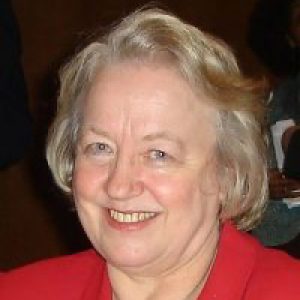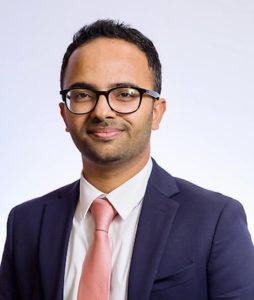RA Research Results Funded by the Virginia T. Ladd Young Investigator Program

RA Research Results Funded by the Virginia T. Ladd Young Investigator Program
Dr. Tarun Sharma, a rheumatologist from the Allegheny Health Network in Pittsburgh, is a recent recipient of a research grant from the Virginia T. Ladd Young Investigator Program. His research focuses on the outcomes of implementing tapering of biologics and non-biologics in stable, well-controlled rheumatoid arthritis patients using a multi-faceted tapering strategy.
This work is particularly notable because, as a young researcher (defined by the Virginia T. Ladd Young Investigator Program as being under the age of 40), Dr. Sharma is leading the way for other young researchers to tackle autoimmune-related questions. Historically, many researchers who begin studying autoimmune disease eventually branch into other areas where funding is greater and more accessible. Seeing this challenge, in 2015 our Board of Directors, on the advice of our Scientific Advisory Board, made a decision to focus funding on the work being conducted by younger researchers as a way to build long-term interest in autoimmune research. Additionally, to further support their careers and professional goals, the grant program provides awardees with leadership mentors, and provides engagement and networking with our Scientific Advisory Board, the association, and larger autoimmune scientific community to both the awardee and their mentor.
In 2017, the program was officially named the Virginia T. Ladd Young Investigator Program in honor of my founding of the Autoimmune Association, formally known as AARDA. I am thrilled to have my name associated with the next generation of researchers who will uncover much-needed answers in the fight against autoimmune disease. To date, $320,000 has been awarded to 13 awardees, and all have continued to work in autoimmune research. The program currently funds five two-year research studies. Dr. Sharma’s work recently concluded.

Dr. Sharma’s research looked at the optimal strategy for tapering treatment with biologics and non-biological RA medications to treatments with less risk in well-controlled RA patients to maximize the wellbeing of the patient has been a long-standing concern for both physician and patient. The practice-based study was conducted over a two-year period. The study shed light on the chances of a flare of RA with different tapering strategies and attempts to predict which patients might be good candidates for medication tapering. The study results concluded that tapering of both biologics and non-biologics together led to higher odds of flares. However, he found that in cases where a flare occurred, resuming the previous treatment regimen led to disease control with in 2-3 months. The findings help both physician and patient decision making by being better informed and able to participate in shared decisions regarding what is the most suitable long-term therapy strategy for individual patients with RA.
We congratulate Dr. Sharma and all Virginia T. Ladd Young Investigator Program awardees for their excellent investigation in autoimmune disease, and we encourage other young investigators to focus their research in this growing area where there is much opportunity and new discoveries waiting to be explored.
Join our email list
Receive the latest blog articles, news, and more right to your inbox!
Related articles you might be interested in

Autoimmune Association Continues to Advocate to Protect Copay Assistance and Essential Health Benefits





Autoimmune Association and Patient Advocacy Organizations Host Dr. Vicky Shanmugam, Director of the Office of Autoimmune Disease Research





Facing a Rare Autoimmune Lung Disease: A Battle for Breath





Raising Autoimmune Awareness in Tribal Communities
Find more resources on autoimmunity
Learn more about autoimmunity, diagnosis tips, how to find a physician, and more.